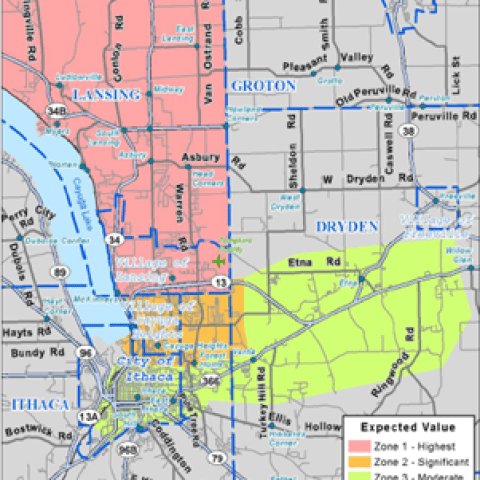What is the Lansing Non-Pipes Alternative?
by Agnes Guillo

Imagine waking up on the coldest morning of the year. You unearth yourself from layers of blankets and walk across the frigid floor to the thermostat. You turn up the heat but find that it is not working. You trudge down the stairs and into the basement to discover that the pilot lights on your furnace have gone out.
This scenario is avoidable, with strategies from NYSEG to successfully meet energy demand in Lansing, New York.
For more than a decade, Lansing has been subject to gas reliability issues. NYSEG’s models have shown that during times of peak use—like early on very cold mornings when many area residents turn up their thermostats at the same time—there is the possibility that gas pressure could fall below safe levels, especially at the end of the pipeline. This poses the risk of homes and businesses experiencing low gas pressure or pilot lights going out.
Once this issue came to light, regulators and NYSEG imposed a gas moratorium in the Lansing area, which meant that no new gas hookups would be allowed. But that only stopped the situation from getting worse; the reliability concern still needed to be addressed.
As a solution to this reliability issue, NYSEG proposed building a larger, new gas pipeline. The proposed pipeline, which would run along East Dryden Road, would provide a quantity of gas that, many believed, far exceeded the energy needs of the community.
Some community members opposed NYSEG’s proposal. “If this pipeline [was] built, it [would] make it harder for us to meet our greenhouse gas emission goals,” explained Martha Robertson, the former chair of the Tompkins County Legislature.
As a result, the Tompkins County Energy and Economic Development Task Force was formed—a mixed group made up of 19 individuals spanning community experts, engineers, construction and development workers, environmentalists and activists, economic development agency representatives, the manager of the Cayuga Power Plant, and local legislators. This task force pledged “to bring a broad variety of voices to the discussion of community goals and strategies, as well as tangible steps to meet both energy and economic development goals”.
The task force met between 2015 and 2016, collectively defining eight key recommendations that could be initiated in the following five years that would advance both the County’s greenhouse gas emissions and economic development goals.
It was this group that initially proposed the idea of a Non-Pipes Alternative (NPA) to NYSEG. The goal was to solve the gas reliability issue by actually decreasing the demand for gas primarily through conversions to renewable and sustainable energy sources, with an emphasis on heat pump technology.
Ultimately, NYSEG approved a suite of Non-Pipes Alternatives and funded six different projects that share the common goal of supporting the Lansing community to achieve greater energy efficiency, create a secure energy economy by not depending on fossil fuels, and support the transition to beneficial electrification opportunities.
“We were looking to diversify the portfolio [of NPA projects] across those three components,” shared Katelyn Huette, Lead Analyst Non-Wires and Non-Pipes Alternatives. “Cost effectiveness, amount reduction to be seen in the gas distribution system, and maximization of the number of customers within the Lansing area that could take part of, be affected by, and be eligible for these projects. I think it has been executed well so far with a couple more pieces left to fall into place.”
Of the six funded projects, four have been publicly announced at this time. The Cornell Child Care Center will be installing a new geothermal heat pump system and heat pump water heater (HPWH). These installations will provide space heating and cooling, as well as heating for the domestic hot water supply to the children and staff at this facility. This is the first installation of its kind on Cornell’s campus. They “may need to use more of this technology for other facilities going forward,” explained Olaf Gustafson, a geologist within Facilities Engineering at Cornell University. “I’m really interested to see how [the Cornell Child Care Center geothermal system] performs.”
Another project will take place in the Lansing Central School District High School and Middle School buildings, which will be getting physical upgrades to make them more comfortable and energy efficient, as well as upgrading to higher-efficiency natural gas boilers.
An education and outreach initiative associated with this program is being conducted through Cornell Cooperative Extension Tompkins County. There is also a community campaign offering additional financial incentives for gas customers in the area to upgrade to heat pump technology.
Earth Sensitive Solutions is leading the community campaign. They will connect homeowners to partner contractors who can provide free home energy assessments and offer suggestions for reducing overall energy use and switching to appliances that don’t use gas. These include additional insulation, air-sealing, and conversion to heat pump technology, which efficiently provides both space heating and cooling through the same equipment.
This community campaign offers additional incentives—stackable with incentives and rebates available to everyone statewide—to people interested in upgrading from gas to heat pumps. The map below illustrates the zones within which homes and businesses are eligible for the additional Lansing NPA incentives.

Please note, while homeowners and businesses in Zone 1 (in pink) are able to receive the full additional incentives, people near Lansing (in Zone 2 and 3) are eligible for 40% and 10%, respectively, of the offered Lansing NPA incentive!
 Interested in learning more?
Interested in learning more?
Contact Guillermo Metz, Energy & Climate Change Team Leader at CCE Tompkins at gm52@cornell.edu or (607) 272-2292 ext. 185
You can also visit Earth Sensitive Solutions at www.earthsensitive.com.
